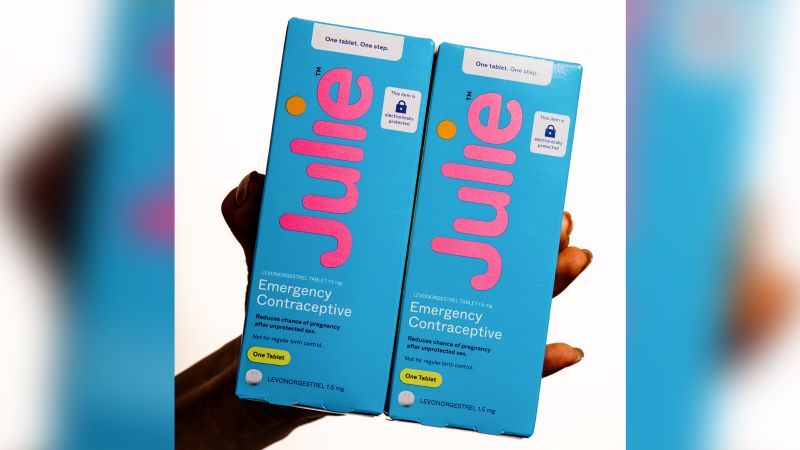One maker said it is responding to high demand for the morning-after pill, after the US Supreme Court last year ended a constitutional right to abortion, by speeding up availability of the emergency contraceptive in retail stores and introducing a new two-count pack.
Julie launched as a one-step tablet of emergency contraceptive containing Levonorgestrel, the key ingredient in the popular Plan B emergency contraceptive that was approved by FDA in late 1990s without a prescription, at 4,500 Walmart stores nationwide last September.
The startup experienced a surge in demand for its $42 tablet at launch amid an overall spike in purchases of emergency contraceptive following the US Supreme Court’s ruling overturning Roe v. Wade in on June 24, 2022.
The FDA-approved morning-after pill can reduce the chance of pregnancy after unprotected sex or failure of another contraceptive method like a condom, and is ideally taken within 72 hours. The pill, which is legal in all 50 US states, works by delaying ovulation or preventing implantation and cannot terminate a pregnancy.
While the plan from the beginning was always to make the product widely accessible as quickly possible, the Supreme Court’s ruling only compelled the startup to accelerate the timetable for Julie’s nationwide rollout.
“The Dobbs decision and overturning Roe v. Wade last year rocked everyone’s world, our customers and our retail partners,” said Amanda E/J Morrison, cofounder of Julie. “It lit a fire under us to provide our product to more women and, more importantly, to educate women about emergency contraceptives.”
In April, just seven months after hitting the market, Julie is now expanding into 5,600 CVS stores and 1,500 Target stores. The brand is also introducing a new 2-count pack of its emergency contraception (which has a three-year expiration period). The two-count pack rolled out at CVS locations over the weekend.
“With the two-pack, we want to make it easier for women to keep extra emergency contraceptive at home, just like they would with other birth control options like condoms,” said Morrison.
The price for two-count pack is $70. Morrison said the pill works most effectively the closer it is taken after unprotected sex, ideally within 72 hours.
Dr. Colleen Denny, a clinical associate professor in the department of obstetrics and gynecology at NYU Grossman School of Medicine, said she saw the upside to a two-count pack of emergency contraception, which she hasn’t seen before from other emergency contraception brands.
“It generally makes sense for barriers to emergency contraception, prescription and over the counter, to be as low as possible,” said Denny,
“Emergency contraception is incredibly safe and effective at preventing pregnancy when used in the right time frame,” she said. “Relationships are complicated. There can be situations where there isn’t access to emergency contraception or women might not ask the partner to use it. So being able to have access to one pill and a backup is a great idea.”
Kelly Cleland, executive director of the American Society for Emergency Contraception, said emergency contraception brands, like Julie, still have to work harder at making the product not only more accessible, but also more affordable.
“I am in favor of expanding access, but this is a missed opportunity when a generic brand comes into the market with a high price barrier,” Cleland said about Julie’s $70 price for the two-count pack.
Cleland said a study done last year by the American Society for Emergency Contraception on access to emergency contraception in stores compared price at retail for branded and generic emergency contraception options. The report said some generic options were priced at $6 or less.
Julie said it set the price for its single pill and two-count pack so it can fund its one-for-one donation program (in which the company donates one box for every box purchased) and to cover business costs tied to packaging and marketing.
By overturning Roe v. Wade, the Supreme Court revoked the notion that the constitutional right to privacy included an abortion. In Dobbs v. Jackson Women’s Health Organization, the Supreme Court expanded states’ authority to regulate or restrict abortion.
A total of 26 US states have since implemented new abortion restrictions or all-out bans.
In the rulings’ immediate aftermath, doctors and prescribers saw a sharp jump in demand for different forms of contraception, including emergency contraception, and longer-lasting forms of birth control. The rush on emergency contraceptives forced some pharmacy chains to impose temporary purchase limits.
“Every time there is a new development on restrictions to reproduction health care, there’s a run on emergency contraceptive. Our retail partners confirmed this,” said Morrison, adding that news events continue to influence buying patterns for emergency contraceptive.
“The current political climate has emboldened Julie,” Morrison said. This, according to the company, includes expanding Julie’s available within communities through unexpected places like bars, restaurants and coffee shops.
Read the full article here










